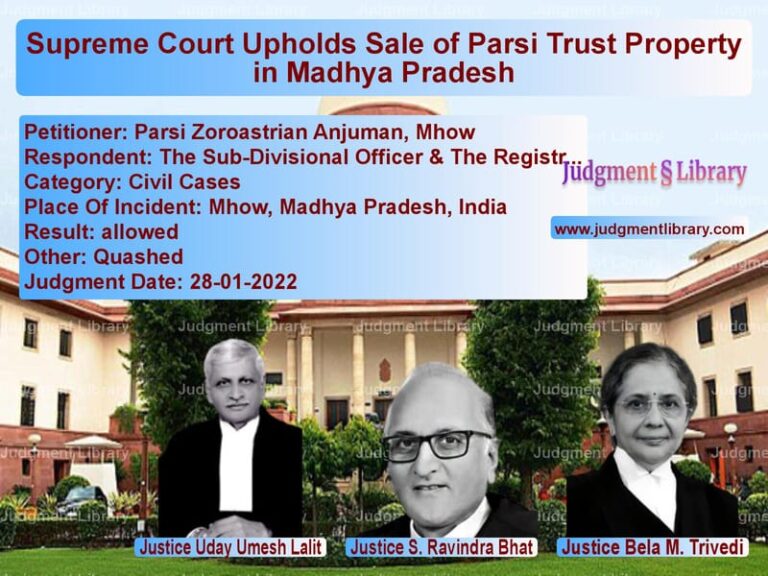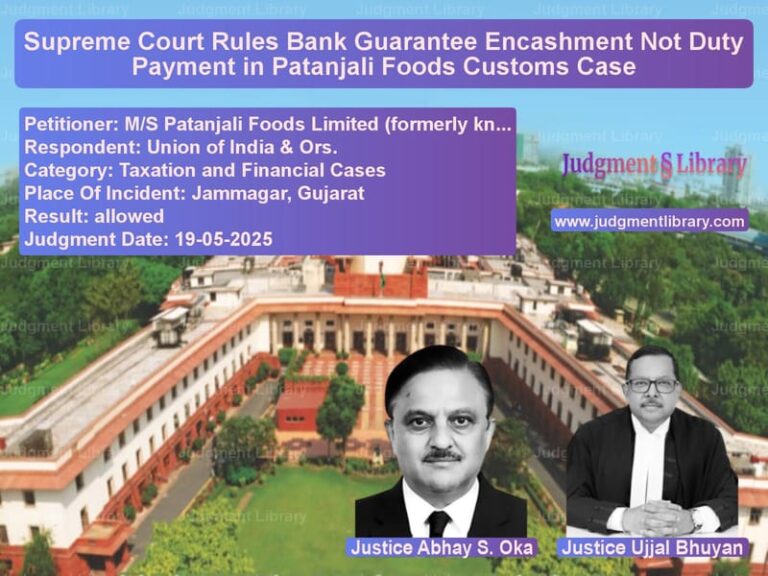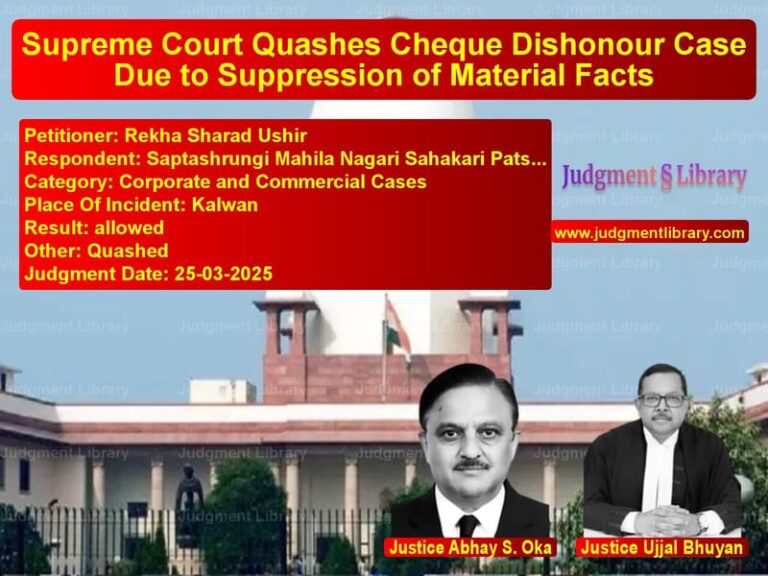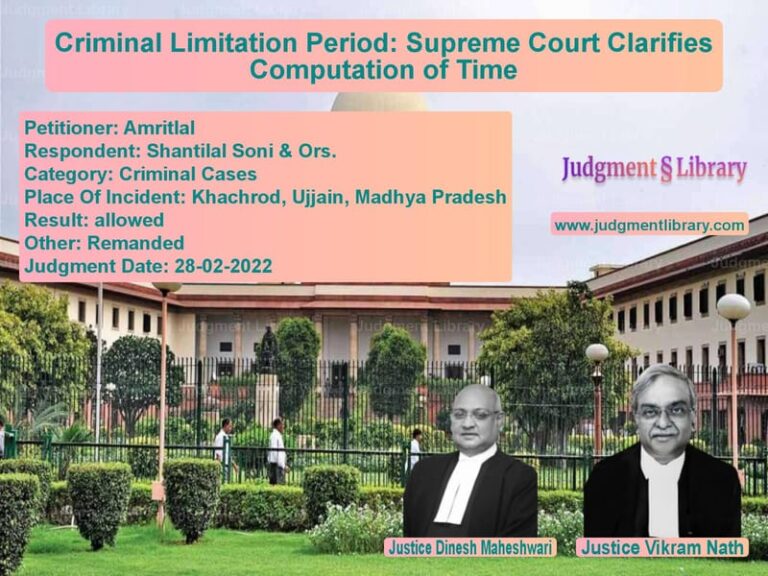Supreme Court Upholds Validity of Excise Act’s Section 9-D in Golden Tobacco Case
The Supreme Court of India, in the case of G.T.C. Industries Ltd (now known as Golden Tobacco Limited) vs. Collector of Central Excise & Others, upheld the constitutional validity of Section 9-D of the Central Excise and Salt Act, 1944, and dismissed the appeals challenging adjudication proceedings based on statements recorded under this provision. The Court imposed costs on the appellants for unnecessarily prolonging litigation.
Background of the Case
The case stemmed from allegations that Golden Tobacco Limited (formerly G.T.C. Industries Ltd.) and its job workers had engaged in deceptive pricing practices. The Central Excise Department issued show-cause notices in March 1988, alleging that the company sold cigarettes at a declared lower price but received additional payments through a marketing chain, evading excise duty. The department relied on the statements of 75 witnesses to support its case.
The petitioners challenged these proceedings before the Delhi High Court, primarily contesting the invocation of Section 9-D, which allows statements recorded during an investigation to be used as evidence without requiring the presence of the witness in adjudication. The High Court upheld the validity of Section 9-D but failed to address the petitioners’ grievance regarding procedural violations in adjudication. The petitioners then appealed to the Supreme Court.
Arguments by the Appellants (Golden Tobacco Limited)
- The appellants did not challenge the constitutional validity of Section 9-D but contended that the High Court, while upholding the provision, failed to apply its safeguards in their case.
- The company argued that cross-examination was denied for a majority of the witnesses whose statements formed the basis of the excise demand.
- The Tribunal had earlier ruled in favor of some job workers, which was later overturned by the Supreme Court, leading to fresh adjudication.
- The petitioners contended that the adjudication orders did not comply with the safeguards under Section 9-D, rendering them invalid.
Arguments by the Respondents (Collector of Central Excise & Others)
- The respondents maintained that Section 9-D was constitutional and applied correctly in the adjudication proceedings.
- They argued that cross-examination was permitted in select cases and was not an absolute right in adjudication proceedings.
- The department asserted that the Supreme Court had previously upheld excise demands in related cases involving the same company and its job workers.
Supreme Court’s Analysis and Judgment
The Supreme Court examined the procedural history of the case, including prior rulings by the Tribunal and the High Court. The key observations were:
- Section 9-D’s Constitutionality: The Court reaffirmed the High Court’s ruling that Section 9-D was valid and provided a structured framework for admitting statements recorded during investigations.
- Litigation History and Finality of Tribunal Decisions: The Court noted that multiple appeals arising from the same excise demand had already been dismissed for non-payment of pre-deposits.
- Procedural Issues Not Addressed: While the appellants contended that the adjudicating authority had misapplied Section 9-D, the Court held that this argument was irrelevant since all legal remedies, including appeals before the Tribunal, had been exhausted.
- Unnecessary Litigation: The Court found that the appeals had no practical effect, as the excise demands against the company had already been upheld in earlier proceedings.
The Court ruled:
“The contentions raised by Mr. Bagaria that the parameters of Section 9-D were completely ignored while the adjudication orders were made could have been regarded to be of some worth if only any remedy by way of an appeal before the departmental authority or by a petition before any court were open to be pursued by the appellants as on the date these civil appeals came up for consideration before us.”
Final Verdict
- The Supreme Court upheld the High Court’s ruling, affirming the validity of Section 9-D.
- It dismissed the appeals, concluding that no live dispute remained for adjudication.
- The Court imposed a cost of Rs. 5,00,000 on the appellants for prolonging litigation without any substantive grounds, directing the amount to be donated to a charitable organization assisting children with cancer.
This judgment reinforces the principle that legal challenges must serve a substantive purpose and not merely prolong litigation. It also clarifies the proper application of Section 9-D in excise proceedings.
Petitioner Name: G.T.C. Industries Ltd (now known as Golden Tobacco Limited).Respondent Name: Collector of Central Excise & Others.Judgment By: Justice S. Ravindra Bhat, Justice Dipankar Datta.Place Of Incident: Delhi.Judgment Date: 08-02-2023.
Don’t miss out on the full details! Download the complete judgment in PDF format below and gain valuable insights instantly!
Download Judgment: g.t.c.-industries-lt-vs-collector-of-central-supreme-court-of-india-judgment-dated-08-02-2023.pdf
Directly Download Judgment: Directly download this Judgment
See all petitions in Tax Evasion Cases
See all petitions in Judgment by S Ravindra Bhat
See all petitions in Judgment by Dipankar Datta
See all petitions in dismissed
See all petitions in supreme court of India judgments February 2023
See all petitions in 2023 judgments
See all posts in Taxation and Financial Cases Category
See all allowed petitions in Taxation and Financial Cases Category
See all Dismissed petitions in Taxation and Financial Cases Category
See all partially allowed petitions in Taxation and Financial Cases Category







